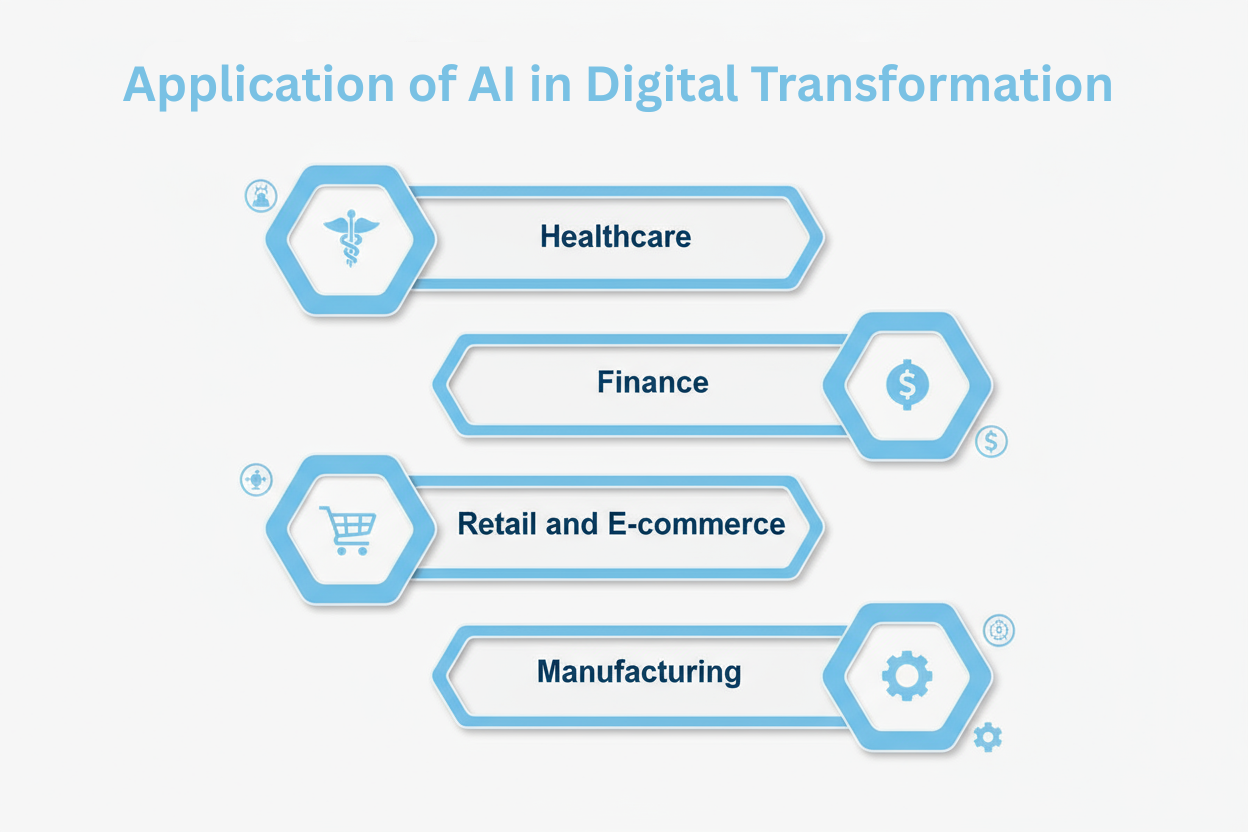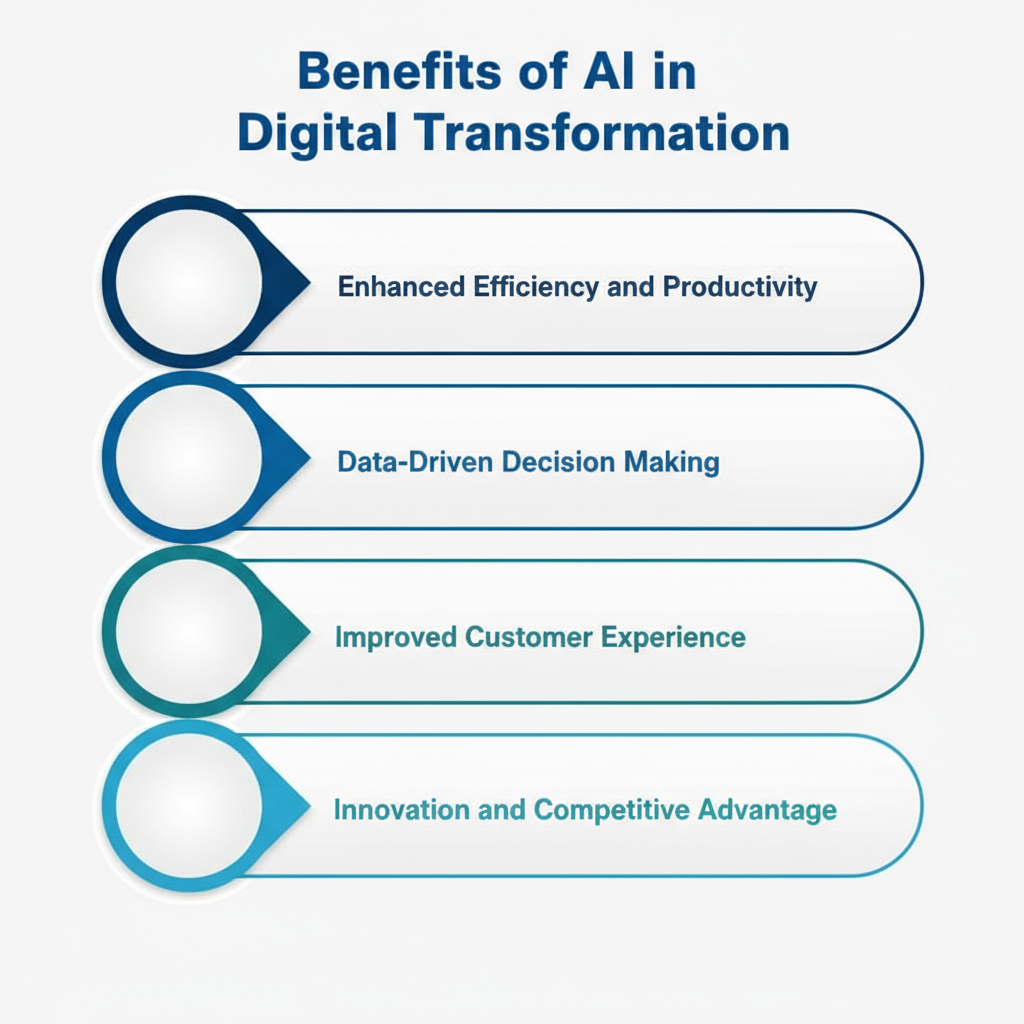Introduction
In today’s rapidly evolving digital landscape, technology drives innovation across all sectors. Digital transformation is reshaping how we live, work, and connect. At the forefront of this change is Artificial Intelligence (AI), which is redefining the standards of progress.
AI enables new opportunities by learning, adapting, and predicting outcomes. It transforms large volumes of data into informed decisions and efficient experiences. From automating workflows to personalizing user interactions, AI is a key driver of digital advancement.
As industries adopt automation and data-driven strategies, AI serves as a primary enabler of transformation. By combining human creativity with computational intelligence, AI is shaping a more intelligent digital world. The future is actively being developed through AI innovation.
Understanding Digital transformation
Digital transformation is the strategic integration of digital technologies into all areas of an organization, fundamentally changing how it operates and delivers value to customers.
- It encompasses adopting tools such as automation, artificial intelligence, and cloud computing. The goal is to improve efficiency, agility, and innovation in business processes.
- It requires not only technological advancements but also a cultural shift within the organization. Employees must embrace continuous learning, adaptability, and a willingness to challenge traditional ways of working.
- It improves collaboration and streamlines operations across departments. Ultimately, it positions a business to remain competitive and resilient in a rapidly evolving digital economy.
Achieving successful digital transformation enhances customer experiences and drives intelligent decision-making through data analytics.
Artificial Intelligence: The Driving Force
Artificial Intelligence (AI) replicates human intelligence in machines that learn, reason, and make decisions autonomously. Its key branches Machine Learning, Deep Learning, and Natural Language Processing, enable adaptive learning, complex analysis, and human-like communication.
- The rise of AI in business results from advances in data processing, cloud storage, and the streamlining of algorithms for rapid execution. Companies now leverage AI to forecast trends, personalize services, and enhance efficiency.
- AI has revolutionized industries such as healthcare, finance, retail, and manufacturing by enabling professionals to make informed decisions and develop innovative strategies.
- AI accelerates innovation, improves productivity, and supports major business shifts by automating everyday tasks, analyzing information, and enhancing customer service. Leveraging AI keeps companies competitive and growing in the digital era.
Integration of AI in Digital Transformation
Artificial Intelligence integrates into digital transformation by automating processes and optimizing workflows. It empowers organizations to achieve greater accuracy and efficiency while reducing human error.
AI strengthens decision-making by turning raw data into actionable insights. Predictive algorithms help businesses anticipate market trends and make smarter, faster choices.
It also personalizes user experiences and fortifies digital systems through intelligent automation. From virtual assistants to cybersecurity, AI ensures a more agile and future-ready digital landscape.
Benefits of AI in Digital Transformation
- Enhanced Efficiency and Productivity: AI streamlines repetitive tasks so employees can focus on strategic work, resulting in faster processes, fewer errors, and increased productivity.
- Data-Driven Decision Making: AI uses advanced analytics and machine learning to turn large volumes of data into actionable insights, enabling organizations to make accurate and timely business decisions.
- Improved Customer Experience: AI enables personalized recommendations, chatbots, and real-time support systems. These tools enhance customer satisfaction and foster stronger brand loyalty.
- Innovation and Competitive Advantage: By encouraging experimentation and adaptability, AI drives innovation across industries. Businesses that adopt AI gain an edge through smarter operations and future-ready solutions.
Application of AI Across Industries

- Healthcare: AI revolutionizes healthcare through accurate diagnostics, predictive analysis, and personalized treatment plans. Tools like AI imaging systems and virtual health assistants improve patient outcomes and operational efficiency.
- Finance: In the financial sector, AI enhances fraud detection, automates risk assessment, and supports smart investment strategies. Chatbots and AI-powered advisors also improve customer service and financial planning.
- Retail and E-commerce: AI personalizes the shopping experience with product recommendations, demand forecasting, and dynamic pricing. It helps retailers understand consumer behavior and optimize inventory management.
- Manufacturing: AI-driven automation and predictive maintenance reduce downtime and improve production quality. Smart robots and sensors monitor operations in real time, ensuring safety and efficiency.
Its ability to analyze data, learn patterns, and make intelligent decisions drives innovation and efficiency across industries.
Future of AI in Digital Transformation
Artificial intelligence is evolving beyond narrow, task-based uses to become central to enterprise strategy. MIT’s framework notes a shift from routine automation to collaborative intelligence, where human expertise and machine capabilities are seamlessly integrated.
- Generative AI is not just hype—it’s transforming creativity, R&D, and content production. Large firms expect GenAI to proliferate across functions, enabling new designs, customized experiences, and even product innovations.
- Sustainability, ethics, and human-AI collaboration are becoming non-negotiable in future digital transformations. Studies show that green innovation mediates performance gains from AI, and that companies with better human-AI governance achieve stronger long-term value.
- AI is also increasingly expected to transform how organizations manage risk and compliance. With regulatory landscapes tightening around data usage, privacy, and algorithmic accountability, future AI systems will need built-in transparency, bias mitigation, and auditability.
- As a result, businesses that proactively invest in ethical AI frameworks—not just technical innovation—will enjoy stronger trust, fewer legal pitfalls, and sustainable growth.
Case Studies and Real-World Examples
IBM Watson Health
IBM Watson Health has transformed healthcare by combining artificial intelligence with advanced data analytics. Its system processes massive volumes of medical data—clinical research, patient records, and diagnostic reports—to provide doctors with evidence-based insights.
- Through natural language processing and machine learning, Watson Health can interpret complex medical terminology and detect patterns invisible to the human eye.
- It assists in diagnosing diseases like cancer, predicting treatment outcomes, and personalizing care plans based on a patient’s unique medical history.
- Watson Health promotes global collaboration by sharing medical knowledge across institutions. It reduces errors, enhances efficiency, and supports preventive healthcare through predictive analytics.
Tesla
Tesla has redefined modern transportation by pioneering autonomous vehicle technology powered by artificial intelligence. Its self-driving system relies on advanced sensors, cameras, and neural networks to analyze real-time traffic conditions and make instant driving decisions.
- The company’s AI-driven “Autopilot” and “Full Self-Driving” systems continuously learn from millions of miles of data collected from Tesla vehicles.
- This deep learning process allows the cars to recognize patterns, avoid obstacles, and improve navigation accuracy over time. Each software update makes the vehicles smarter and more responsive to complex environments.
- Beyond autonomy, Tesla’s vision extends to creating a fully connected, sustainable transportation ecosystem. By merging electric mobility with AI innovation, Tesla is not only reducing emissions but also redefining the future of how humans move.
NVIDIA
NVIDIA has revolutionized the gaming industry by integrating artificial intelligence into its graphics technology. Its AI-powered GPUs and software enable lifelike visuals, faster rendering, and smoother gameplay experiences.
- One of NVIDIA’s most groundbreaking innovations is DLSS (Deep Learning Super Sampling), which uses AI to upscale lower-resolution images into high-quality visuals without compromising performance.
- This technology allows gamers to experience sharper graphics and higher frame rates even on demanding titles. It showcases how AI can balance beauty and efficiency in gaming.
- Beyond gaming, NVIDIA’s AI technology is shaping fields like simulation, virtual reality, and digital content creation. Its advancements not only enhance entertainment but also push the boundaries of visual computing.
Conclusion
Artificial Intelligence has become the backbone of digital transformation, empowering industries to operate smarter and faster. It bridges the gap between human creativity and technological precision, creating endless opportunities for growth.
As AI continues to evolve, its influence will expand beyond automation to innovation and sustainability. Organizations that embrace AI responsibly will lead the next wave of digital progress.
Ultimately, the future of transformation lies in balancing intelligence—both human and artificial.
Together, they will shape a world that’s not only digital but deeply intelligent and connected.
The journey ahead demands ethical awareness, adaptability, and continuous learning. By aligning AI with human values, society can ensure that technology serves progress with purpose and compassion.

